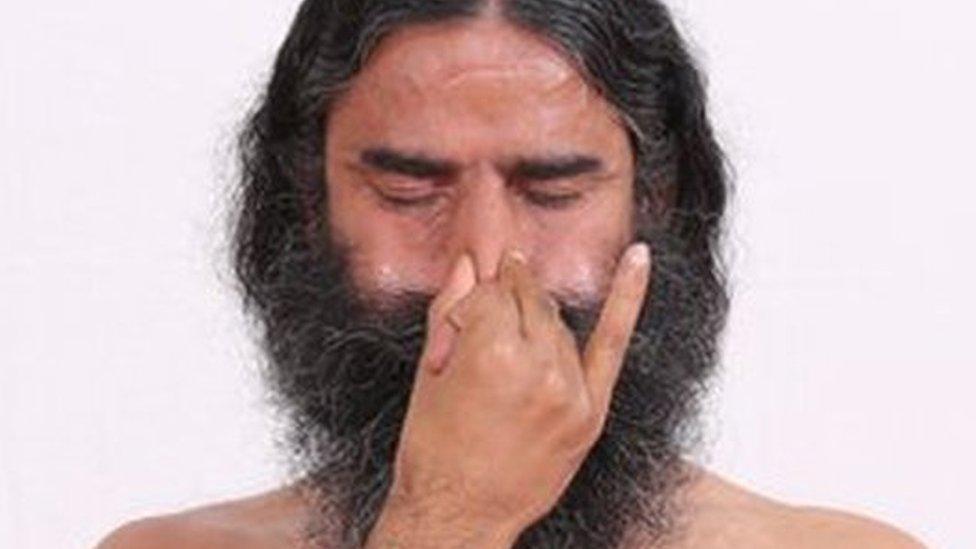Baba Ramdev: The yoga guru under fire over Patanjali's 'natural cures'
- Published

Patanjali sells a host of products, ranging from toothpaste to skin care and wellness products and even food
Popular Indian yoga guru Baba Ramdev has millions of followers around the world. Now his image has taken a beating after India's top court ordered him to apologise for falsely claiming that his company's products can "cure" serious illnesses. So, how did the man and his story unravel?
In a video on his YouTube Channel Swami Ramdev - that has over 10 million subscribers - the yoga guru lies on his back on the stage, knees curled up to his chest in 'pawanmuktasan', a yoga pose that's supposed to ease flatulence.
Next to him is a stack of medicines produced by Patanjali Ayurved, which claims to sell "herbomineral preparations".
Formed by Baba Ramdev and his close aide Acharya Balkrishna in 2006, Patanjali sells everything from toothpaste to skin care and wellness products. But the Ayurvedic medicines are among its most sought-after products.
He lists out a range of health issues - from fever and typhoid to liver damage and skin problems - and chides his audience for using "poisonous, synthetic" medicines to treat , externalsuch illnesses. He urges them to use Patanjali products instead.
In another video, he explains what cancer is, external and claims that chemotherapy, radiation and surgery do not address the cause of the disease.
He then makes the extraordinary claim that Patanjali's "anti-cancer juice", combined with a strict diet regimen, helps "cure all types of cancer in seven days to two months".
His audiences break into applause.
But last week, India's Supreme Court banned the ads, saying the yoga guru was spreading misinformation and misleading consumers.
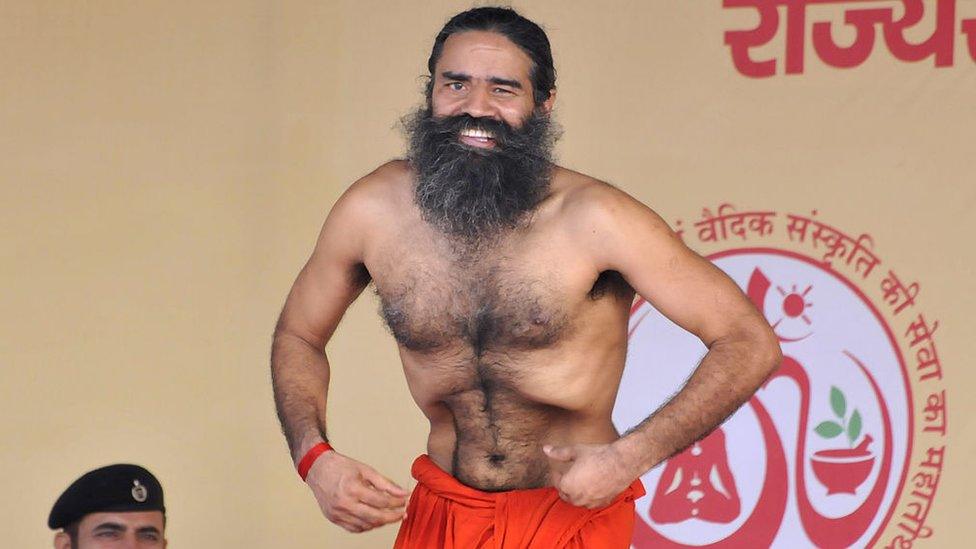
Baba Ramdev has millions of followers around the world
According to the Drugs and Magic Remedies (Objectionable Advertisements) Act 1954, it is illegal to promote drugs meant for the treatment and cure of 54 medical conditions, including cancer, heart disease and blood pressure.
The judges refused to accept Baba Ramdev and Mr Balkrishna's "unconditional apology", saying they had "wilfully disobeyed" their order. "Your apology is not worth the paper it's written on," the court said, external, adding that "you [should] suffer consequences".
The judges also rebuked the State Licensing Authority - the watchdog for Ayurvedic drugs and other traditional medicinal practices - and the Uttarakhand government (the Himalayan state where Patanjali's headquarters is located) for not taking action against Patanjali for violating laws.
"We will rip you apart," they said, external and chided the authorities for remaining in a "deep slumber" and "passing the buck".
The court ordered Patanjali and its founders to issue a public apology before the next hearing to 23 April.
Experts, however, say the court's reprimand is too little, too late.
They point out that Patanjali and Baba Ramdev have a long history of dismissing allopathic drugs, external and legitimate medical practices as ineffective, while championing the curative powers of their products. The BBC has reached out to Patanjali for a response to this allegation.
In 2021, during the Covid-19 pandemic, Patanjali had launched Coronil - a herbal tablet - which it claimed could "treat and cure" the coronavirus.
Marketing had to be stopped after an intervention by the Indian government, which said there was no data to show it worked as a treatment. However, the company continued to insist that it worked against the virus.
It's not just their drugs - Patanjali's edible goods have also been criticised for being sub-standard.
In 2022, Patanjali's "pure cow ghee" (clarified butter) failed a food safety test, external, but Baba Ramdev dismissed the findings, external by saying that the samples had been tampered with. In 2023, the brand was sent a legal notice, external for allegedly using cuttlefish in a dental product marked as vegetarian.
In fact, Patanjali has faced so many controversies over a decade - as a simple Google search will show you - that it's hard to keep track of all of them.
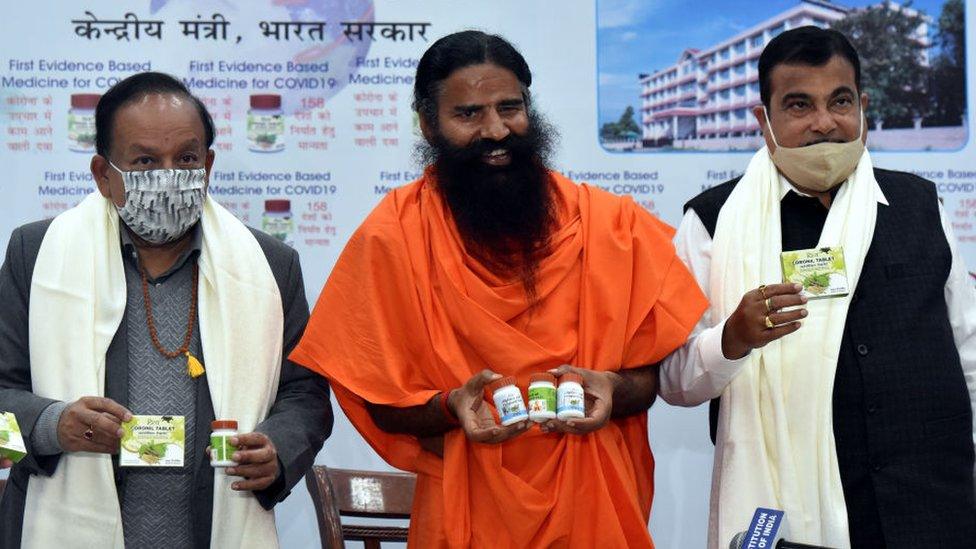
Baba Ramdev (centre) with former Health Minister Harsh Vardhan (left) at the launch of Coronil in 2021
The latest proceedings against the firm started in 2022 after the Indian Medical Association (IMA) went to court against a "false" advertisement claiming that the firm's products could cure thyroid, diabetes and even macular degeneration.
Last year, the court ordered them to stop making such claims and threatened to impose a fine of 10m rupees ($119,600; £96,000) for every product.
Its lawyers agreed to follow the order, but a day later Baba Ramdev doubled down on the "curative" powers of Ayurvedic medicines, external and said he was ready to "face the death penalty" if his claims were found to be false.
He accused some doctors of being biased against traditional medicine and alleged they were spreading false propaganda about his brand.
Patanjali continued airing its controversial ads - in newspapers, on radio, television and at Baba Ramdev's yoga workshops in various states.
The case came back into focus in January when the Supreme Court received an anonymous letter flagging the company's refusal to follow the court's order.
Experts say Patanjali products are dubious because the firm has poor manufacturing practices.
But the brand has vigorously defended its products, claiming that they're clinically proven, external and follow "more than 3,000 research protocols".
In 2016, a court in Haridwar asked, external Patanjali to pay a fine of 1m rupees for selling certain products under its label although it was made by another company.
The court also directed district authorities to take action against the brand if it failed to improve the quality of its products after some essential commodities like salt, jam, oil and honey, had failed quality tests.
At the time, Mr Balkrishna told Times of India newspaper that Patanjali's products were "completely safe", external, their quality was "unquestionable" and that the brand would react "suitably" to the order.
But despite the serious allegations, the firm has escaped regulatory action.
Experts say that's because Baba Ramdev remains a massively popular figure. His followers see him as an expert on all things natural and traditional, insulating Patanjali against any kind of criticism.
The 58-year-old is also believed to have close ties with Prime Minister Narendra Modi and his Bharatiya Janata Party (BJP)-led government.
The yoga guru routinely praises Mr Modi and in the 2014 general election, he openly asked his followers to vote for the BJP.
A 2017 investigation by Reuters news agency, external found that Baba Ramdev's business had boomed since the BJP came to power and Patanjali had been able to acquire thousands of acres of land in BJP-ruled states at discounted prices to set up factories and research centres.
The BBC has reached out to the BJP and Patanjali but has not received responses yet.
- Published21 December 2015
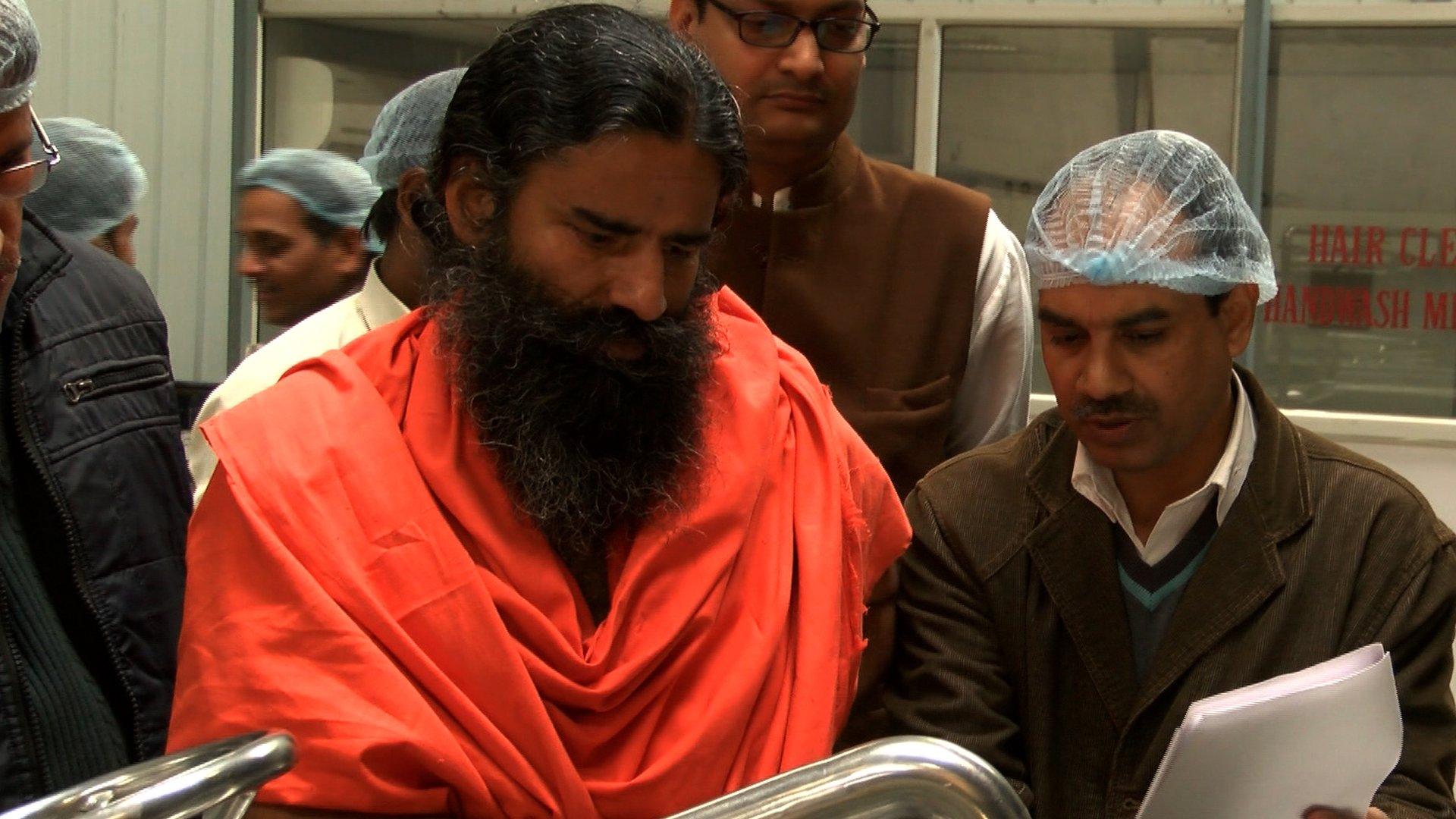
- Published2 May 2011
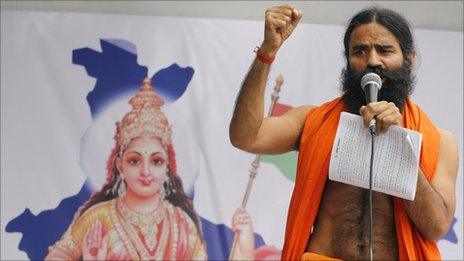
- Published25 May 2021
